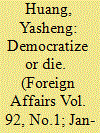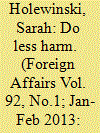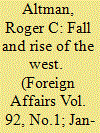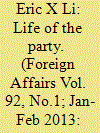|
|
|
Sort Order |
|
|
|
Items / Page
|
|
|
|
|
|
|
| Srl | Item |
| 1 |
ID:
116110


|
|
|
|
|
| Publication |
2013.
|
| Summary/Abstract |
Ehud Barak is one of Israel's most important leaders -- and also one of its most enigmatic and controversial. As defense minister in the current government, Barak prosecuted the November Gaza campaign, handles the Palestinian brief, and, along with Prime Minister Benjamin Netanyahu, gets the last word on whether to attack Iran -- Israel's most pressing security concern despite the recent focus on Hamas. Given the pariah status of Israel's foreign minister, Avigdor Lieberman, Barak, a frequent presence in Washington, essentially covers that portfolio as well. Yet despite 35 years of military service and more than a decade in public life, Barak remains something of a cipher -- a man one of Israel's leading columnists, Ari Shavit, compares to a stealth bomber ("the usual radar doesn't capture him"). "I don't know anyone more difficult to read," Shavit says.
|
|
|
|
|
|
|
|
|
|
|
|
|
|
|
|
| 2 |
ID:
116104


|
|
|
|
|
| Publication |
2013.
|
| Summary/Abstract |
In November, the American electorate, deeply unhappy with Washington and its political gridlock, voted to maintain precisely the same distribution of power -- returning President Barack Obama for a second term and restoring a Democratic Senate and a Republican House of Representatives. With at least the electoral uncertainty out of the way, attention quickly turned to how the country's lawmakers would address the immediate crisis known as the fiscal cliff -- the impending end-of-year tax increases and government spending cuts mandated by earlier legislation.
|
|
|
|
|
|
|
|
|
|
|
|
|
|
|
|
| 3 |
ID:
116106


|
|
|
|
|
| Publication |
2013.
|
| Summary/Abstract |
In 2011, standing in front of the Royal Society (the British academy of sciences), Chinese Premier Wen Jiabao declared, "Tomorrow's China will be a country that fully achieves democracy, the rule of law, fairness, and justice. Without freedom, there is no real democracy. Without guarantee of economic and political rights, there is no real freedom." Eric Li's article in these pages, "The Life of the Party," pays no such lip service to democracy. Instead, Li, a Shanghai-based venture capitalist, declares that the debate over Chinese democratization is dead: the Chinese Communist Party (CCP) will not only stay in power; its success in the coming years will "consolidate the one-party model and, in the process, challenge the West's conventional wisdom about political development." Li might have called the race too soon.
|
|
|
|
|
|
|
|
|
|
|
|
|
|
|
|
| 4 |
ID:
116103


|
|
|
|
|
| Publication |
2013.
|
| Summary/Abstract |
Everyone knows that civilians suffer in war. Even in lawfully conducted conflicts waged for legitimate causes, they lose lives, limbs, and loved ones. What fewer understand is that there are no laws that oblige warring parties to help the civilians they've harmed, as long as the action that caused the harm is considered legal. A fighter jet can strike a weapons cache next to a home, a guard can shoot a suspicious biker at a checkpoint, and a convoy can speed through a playground, but so long as in each instance the armed forces follow the Geneva Conventions' rules of discrimination and proportionality, they never have to explain, apologize, or pay for those losses.
|
|
|
|
|
|
|
|
|
|
|
|
|
|
|
|
| 5 |
ID:
116109


|
|
|
|
|
| Publication |
2013.
|
| Summary/Abstract |
The downfall of David Petraeus sent such shock waves through the policy establishment when it hit the news in November because the cause was so banal: the most celebrated and controversial military officer of our time compelled to resign from his dream job as CIA director as the result of an extramarital affair. Yet long after the headshaking details are forgotten, Petraeus' larger significance will remain, as his career traced one of the era's crucial strategic narratives -- the rise and fall of counterinsurgency in U.S. military policy.
|
|
|
|
|
|
|
|
|
|
|
|
|
|
|
|
| 6 |
ID:
116102


|
|
|
|
|
| Publication |
2013.
|
| Summary/Abstract |
The 2008 financial crisis and the Great Recession that followed have had devastating effects on the U.S. economy and millions of American lives. But the U.S. economy will emerge from its trauma stronger and widely restructured. Europe should eventually experience a similar strengthening, although its future is less certain and its recovery will take longer to develop. The United States is much further along because its financial crisis struck three years before Europe's, in 2008, causing headwinds that have pressured it ever since. It will take another two to three years for these to subside, but after that, U.S. economic growth should outperform expectations. In contrast, Europe is still in the midst of its financial crisis. If historical logic prevails there, it will take four to six years for strong European growth to materialize.
|
|
|
|
|
|
|
|
|
|
|
|
|
|
|
|
| 7 |
ID:
116105


|
|
|
|
|
| Publication |
2013.
|
| Summary/Abstract |
In November 2012, the Chinese Communist Party (CCP) held its 18th National Congress, setting in motion a once-in-a-decade transfer of power to a new generation of leaders. As expected, Xi Jinping took over as general secretary and will become the president of the People's Republic this March. The turnover was a smooth and well-orchestrated demonstration by a confidently rising superpower. That didn't stop international media and even some Chinese intellectuals, however, from portraying it as a moment of crisis. In an issue that was published before the beginning of the congress, for example, The Economist quoted unnamed scholars at a recent conference as saying that China is "unstable at the grass roots, dejected at the middle strata and out of control at the top." To be sure, months before the handover, the scandal surrounding Bo Xilai, the former party boss of the Chongqing municipality, had shattered the CCP's long-held facade of unity, which had underwritten domestic political stability since the Tiananmen Square upheavals in 1989. To make matters worse, the Chinese economy, which had sustained double-digit GDP growth for two decades, slowed, decelerating for seven straight quarters. China's economic model of rapid industrialization, labor-intensive manufacturing, large-scale government investments in infrastructure, and export growth seemed to have nearly run its course. Some in China and the West have gone so far as to predict the demise of the one-party state, which they allege cannot survive if leading politicians stop delivering economic miracles.
|
|
|
|
|
|
|
|
|
|
|
|
|
|
|
|
| 8 |
ID:
116107


|
|
|
|
|
| Publication |
2013.
|
| Summary/Abstract |
As popular demonstrations swept across the Arab world in 2011, many U.S. policymakers and analysts were hopeful that the movements would usher in a new era for the region. That May, President Barack Obama described the uprisings as "a historic opportunity" for the United States "to pursue the world as it should be." Secretary of State Hillary Clinton echoed these comments, expressing confidence that the transformations would allow Washington to advance "security, stability, peace, and democracy" in the Middle East. Not to be outdone, the Republican Party's 2012 platform trumpeted "the historic nature of the events of the past two years -- the Arab Spring -- that have unleashed democratic movements leading to the overthrow of dictators who have been menaces to global security for decades." Some saw the changes as heralding a long-awaited end to the Middle East's immunity to previous waves of global democratization; others proclaimed that al Qaeda and other radicals had finally lost the war of ideas.
|
|
|
|
|
|
|
|
|
|
|
|
|
|
|
|
| 9 |
ID:
116108


|
|
|
|
|
| Publication |
2013.
|
| Summary/Abstract |
Two years after the outbreak of what has come to be known as the Arab Spring, the bloom is off the rose. Fledgling democracies in North Africa are struggling to move forward or even maintain control, government crackdowns in the Persian Gulf and elsewhere have kept liberalization at bay, and Syria is slipping ever deeper into a vicious civil war that threatens to ignite the Middle East. Instead of widespread elation about democracy finally coming to the region, one now hears pessimism about the many obstacles in the way, fear about what will happen next, and even open nostalgia for the old authoritarian order. Last June, when the Egyptian military dismissed parliament and tried to turn back the clock by gutting the civilian presidency, The Wall Street Journal's chief foreign policy columnist cracked, "Let's hope it works." (It didn't.) And Egyptian President Mohamed Morsi's attempted power grab in November made such nostalgia commonplace.
|
|
|
|
|
|
|
|
|
|
|
|
|
|
|
|
|
|
|
|
|